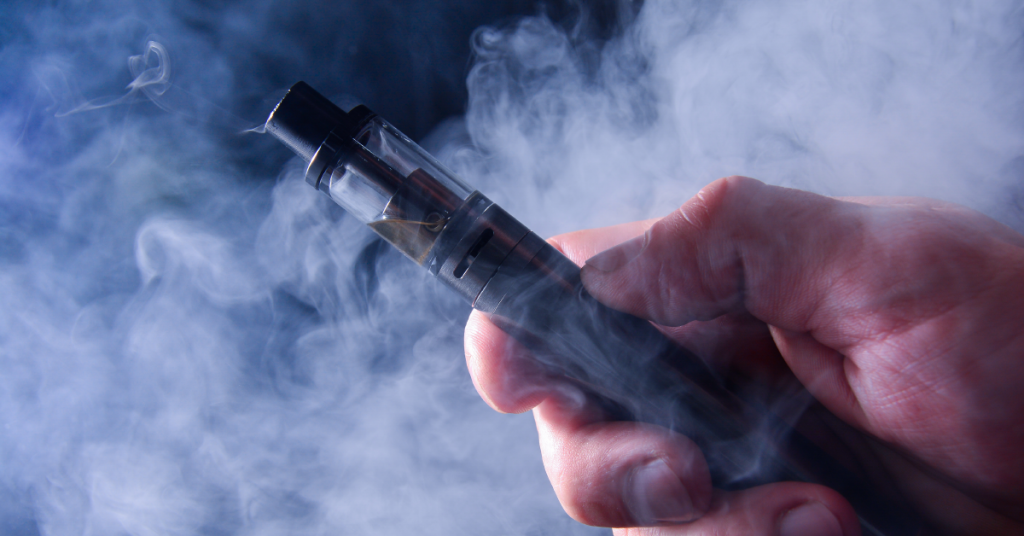
The human-to-human infection of COVID-19 is widespread across the world. Coughing, fever, and shortness of breath are primary symptoms found in most of the patients. COVID-19 also affects the lower respiratory tract, so those patients with chronic cardiovascular and lung disease are at high risk for complications of the disease.
Many advisories have focused on the risk facing older people, those with chronic conditions such as diabetes, and people with compromised immune systems, such as cancer patients. But doctors also caution that users of electronic cigarettes and tobacco are more in danger from the new coronavirus than the average healthy person.
E-cigarettes have come under growing scrutiny since last year when more than 2,000 cases of severe lung damage and death were reported among vapers. Most of those cases were associated with products containing an additive called vitamin E acetate, and THC, the psychoactive component of marijuana, according to the U.S. Centers for Disease Control and Prevention. (WebMD)
Vaping has risks, regardless of what you vape. Starting to use e-cigarettes, or switching from cigarettes to e-cigarettes, increases your risk of adverse health effects. And as confirmed COVID-19 cases rise, medical experts emphasize the reasons to quit vaping.
Key Facts about Use of E-Cigarette, or Vaping, Products
Electronic cigarettes or e-cigarettes are also called vapes, e-hookahs, vape pens, tank systems, mods, and electronic nicotine delivery systems (ENDS).Using an e-cigarette is commonly called vaping.E-cigarettes work by heating a liquid to produce an aerosol that users inhale into their lungs.The liquid can contain nicotine, tetrahydrocannabinol (THC) and cannabinoid (CBD) oils, and other substances, flavorings, and additives. THC is the psychoactive mind-altering compound of marijuana that produces the “high.”
Key Facts about Vitamin E Acetate
Vitamin E acetate is used as an additive, most notably in THC-containing e-cigarette, or vaping, products.Vitamin E is a vitamin found in many foods, including vegetable oils, cereals, meat, fruits, and vegetables. It is also available as a dietary supplement and in many cosmetic products, like skin creams.Vitamin E acetate usually does not cause harm when ingested as a vitamin supplement or applied to the skin. However, previous research suggests that when vitamin E acetate, when inhaled may interfere with normal lung functioning.
(CDC 2020)
How is Vaping Likely to Increase COVID-19 Risk?
According to the CDC, a total of 2,807 (as of Feb 18, 2020) hospitalized EVALI cases or deaths were reported from all 50 states, the District of Columbia, and two U.S. territories (Puerto Rico and U.S. Virgin Islands).
Vaping can cause EVALI (e-cigarette or vaping associated lung injury), a broad descriptor of acute respiratory illness. It can generally manifest with shortness of breath, cough, and rapid and shallow breathing. And COVID-19 is an infection that attacks the lungs, killing lung cells and tissue in its wake, according to the American Lung Association. (Drug Watch)
Some research suggests that the aerosols from e-cigarettes irritate and hurt lung cells. It makes it harder for them to fight infection.
The new coronavirus responsible for the current pandemic causes mild symptoms for many. But those with underlying health concerns, including respiratory problems related to vaping or smoking, might be at higher risk for severe symptoms.
And while there are very little data on e-cigarette use and infectious disease risk, the recent outbreak of deadly vaping-related lung illnesses has alarmed both the scientific world and the public to the potential harms associated with that practice.
How Can Vapers/Smokers Lower Their Coronavirus Risk?
Active smokers and vapers are both likely at higher risk of health problems from the virus. The wisest choice at this moment would be to quit vaping. If you’re a former smoker or vaper, you probably have a lower risk of complications from COVID-19 than current users.
Your lungs heal after you quit smoking. Many people report less coughing and shortness of breath within a few weeks or months. Your cilia begin to regrow and recover quickly. You are more likely to be able to fight off a respiratory infection if your cilia are healthy.
If you need help to quit vaping:
- Consult your doctor about quitting strategies.
- Call medical helpline numbers connected to your state’s quitline sponsored by the government.
To cut your risk of catching COVID-19, always follow the safety steps recommended by public health officials:
- Stay away from others who are likely to exposed to the virus.
- Wash your hands thoroughly and often.
- Try not to touch your nose, mouth, and eyes.
- Disinfect surfaces in your home that get touched a lot.
Use Social Distancing to Quit Vaping
Quitting smoking or vaping can help lower the risk of serious COVID-19 symptoms and support your immune system.
Some health care and addiction experts are also suggesting people to use current social distancing norms as an opportunity to quit vaping. It is especially true for teens who vape.
Parents simultaneously can use current events to discuss lung health and draw connections between the coronavirus and the potential for lung damage from vaping. Families with multiple smokers or e-cig users can use the stay-at-home time to work as a family to all quit vapes, cigarettes, and other tobacco products.
And social distancing from friends who vape, or places where e-cig users like to vape, can also be part of the toolkit for quitting.
As the world grapples with this disease and attempts to contain it, all health care providers are discussing smoking cessation with patients who smoke or vape and the additional threat that COVID-19 poses for them.
Works Cited
Outbreak of Lung Injury Associated with the Use of e-Cigarette, or Vaping Products. Centers for Disease Control and Prevention. 2020. Outbreak Of Lung Injury Associated With The Use Of E-Cigarette, Or Vaping, Products. https://www.cdc.gov/tobacco/basic_information/e-cigarettes/severe-lung-disease.html
Turner, T., 2020. Can Vaping Make COVID-19 Risks Worse? Drugwatch.com. https://www.drugwatch.com/news/2020/04/07/can-vaping-make-covid-19-risks-worse/
Blogs, W., 2020. Coronavirus And Smoking. WebMD. https://www.webmd.com/lung/covid-19-smoking-vaping#1
Academies, N., 2020. Public Health Consequences of e-Cigarettes Nap.edu. https://www.nap.edu/resource/24952/012318ecigaretteConclusionsbyEvidence.pdf
Holmes, R. and Reporter, H., 2020. COVID-19 Likely Worse for Vapers, Smokers. WebMD. https://www.webmd.com/lung/news/20200325/covid-19-likely-worse-for-vapers-smokers#1
